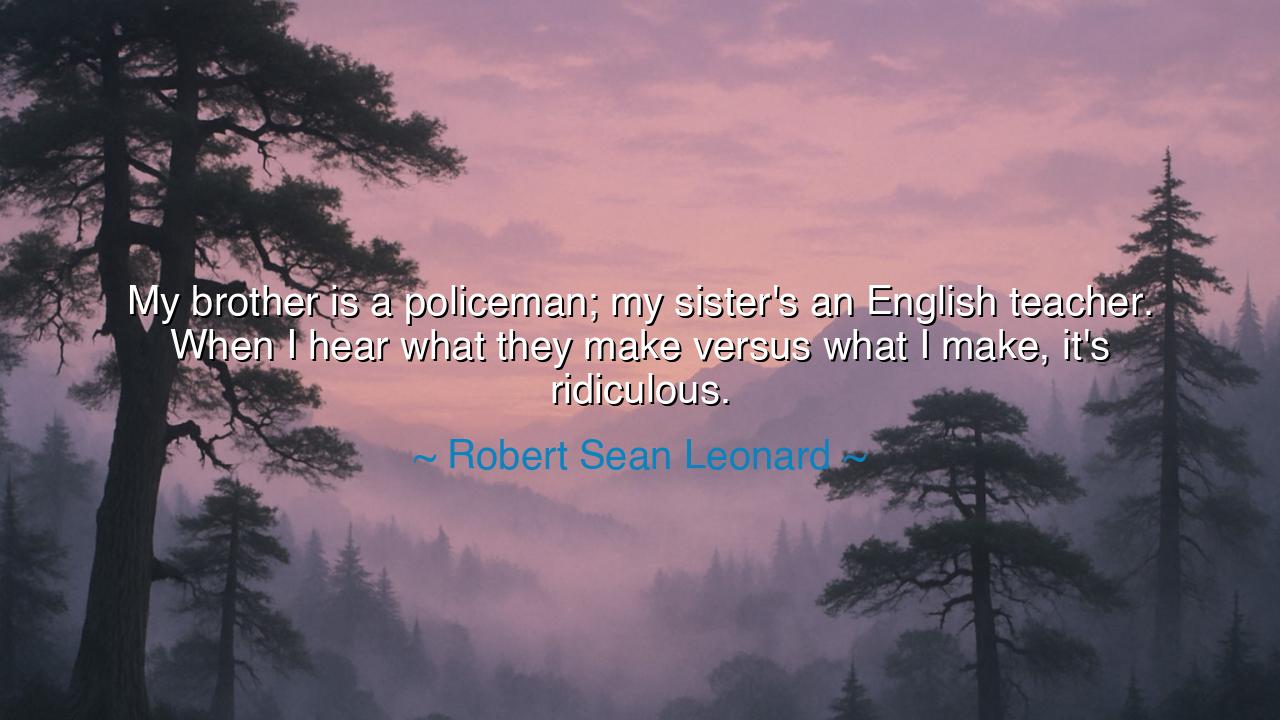
My brother is a policeman; my sister's an English teacher. When
My brother is a policeman; my sister's an English teacher. When I hear what they make versus what I make, it's ridiculous.






Hearken, O children of labor and vocation, to the reflection of Robert Sean Leonard, whose words pierce the veil of worldly expectation: “My brother is a policeman; my sister’s an English teacher. When I hear what they make versus what I make, it’s ridiculous.” In this observation lies a meditation upon the inequities of reward and the strange scales by which society values different forms of service and skill. Leonard’s voice calls us to reflect not only upon earning, but upon purpose, dedication, and the unseen labors of the soul.
The heart of this truth is ancient: labor and merit are not always commensurate with reward. The policeman stands vigilant, protecting life and order; the teacher molds minds and hearts; yet the worldly compensation for such noble efforts often pales beside other pursuits deemed more lucrative. Leonard, in noting the ridiculous disparity, highlights the paradox of human society, where the measure of toil is often external, detached from virtue, courage, or contribution. Here, the ancients would remind us that wisdom and justice transcend the ledger of coins.
Consider the life of Socrates, who labored tirelessly in pursuit of truth and in the education of Athenian youth. Though his guidance shaped generations and preserved the foundations of philosophy, he received no earthly wealth to match the immensity of his influence. Like Leonard’s siblings, many dedicate themselves to service, yet the world often values other forms of labor with greater tangible reward. Socrates teaches that fulfillment is found in the meaning of the work, not merely its remuneration.
Leonard’s reflection also reveals the human tendency to compare and measure oneself against the fortunes of others. The ridiculous sense of disparity can provoke resentment or discouragement, yet the wisdom of the ages counsels a turn inward: to judge one’s work by its integrity, impact, and devotion, not by the caprice of external valuation. True measure lies in contribution to the welfare, knowledge, and protection of society—the noble acts that endure beyond coin or title.
Even in contemporary times, countless men and women toil in professions of high importance yet modest reward. The nurse who labors long hours in service of the ill, the social worker who shelters the marginalized, the artist whose work elevates the human spirit—all encounter the dissonance between effort and worldly compensation. Leonard’s observation is a reminder that recognition, material or otherwise, is not the ultimate arbiter of value; it is the dedication and impact that define a life well-lived.
The teaching, therefore, is twofold. First, cultivate gratitude for one’s vocation and the capacity to contribute, irrespective of remuneration. Second, temper comparison with wisdom, understanding that every role, whether lauded or overlooked, serves a purpose in the intricate web of human society. Leonard’s candid words illuminate the tension between societal valuation and personal fulfillment, a tension that has echoed since the dawn of civilization.
O children of work and contemplation, take this teaching to heart: seek meaning in the purpose of your labor, honor the effort you invest, and recognize the dignity of every contribution, whether rewarded or unrecognized. Comparison may reveal inequity, but it need not diminish resolve; instead, let it remind you of the greater measure of life, which lies in service, integrity, and devotion. The coin of the world is fickle, but the value of noble labor endures eternally.
Thus, let the words of Robert Sean Leonard resonate: the world may measure unfairly, yet the virtue of work is not defined by wages but by dedication, purpose, and impact. Honor your craft, labor with diligence, and let your actions enrich others and yourself. In this, the disparity becomes inconsequential, and the soul finds satisfaction far beyond what earthly reward can bestow.
If you wish, I can also create a practical guide for finding meaning in work despite worldly disparities, inspired by Leonard’s reflection, showing daily practices to cultivate purpose and satisfaction. Do you want me to do that?






AAdministratorAdministrator
Welcome, honored guests. Please leave a comment, we will respond soon